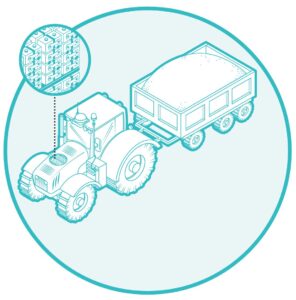You see sophisticated “hackers” in the news almost daily now. In fact, just recently there were several healthcare databases hacked, compromising the health records of millions of people worldwide. Large retailers have also made the headlines recently, with attacks like the one on Target in which a group stole 40 million credit card numbers and the personal information of over 70 million customers.
Unfortunately, the new reality is one in which personal security has become something upon which we must all stay vigilant.
Recently, even electric and telephone cooperatives have begun to see attacks on their members. For instance, many members are now reporting phone calls requesting payment, with the caller threatening disconnection. The hard part is, some cooperatives do, in fact, make collection calls. And, some accept credit cards over the phone to help the member who just can’t make it in to the office.
So, what do you do if you get a call saying you’re late on your bill?
The best thing to do is to let the person know you will call them back. Then, don’t accept a callback number from them. Just call your local cooperative’s phone number. You should have a copy of it on your bill, on your member agreement, or you can always look it up on the co-op’s webpage. Scammers do not want you to call them back because they are not actually at the cooperative’s number. Many times they aren’t even in the United States!
But, what happens if you’re paying online? After all, your cooperative may have a portal set up to allow you to login and pay. You might even be able to pay through your bank’s billing portal.
Let me assure you, using these means are probably the safest ways you can pay. Both co-ops and banks use reputable, hardened sources for processing electronic transactions.
The problem comes when your own computer is infected. And, it’s so easy to get a virus if you don’t keep your computer patched, virus scan updated and even keep a malware removal tool installed and up-to-date.
Each of those things takes just a few moments to do, but can be difficult for the “non-techie” people out there. I always tell people, “I don’t repair my own car, or do my own plumbing, but I can definitely fix my own computer.” By that I mean, we all have areas where we exhibit talent. Just because you can’t fix your computer, doesn’t mean you’re not fully capable in other areas. So, don’t be afraid to ask someone for help when you feel like you’re in over your head.
Keep in mind, it can be difficult to spot some of the attempts to infect your computer. For instance, it is very easy these days to “spoof” a web page. Spoofing is when someone puts up a replica of a site and then directs traffic to it to try to get your username and password for a legitimate site. So, if you receive an e-mail saying your bank account is overdrawn and to “click this link” to login and correct the problem, you may actually see a legitimate looking site when you click the link. Actually though, you’re just visiting a look-alike site. When you enter your login credentials, the thieves will now have your username and password and can login to your account.
Again though, just like the phone call, you can easily prevent such an occurrence by simply visiting the bank’s site directly. Just open a browser window (Internet Explorer, Firefox, Chrome) and manually type in the address you want to visit. Don’t pay attention to the e-mail at all. Use the login information you were given by the bank. That way, you can be sure you’re going to the correct place.
One final note, if you suspect your computer is compromised, discontinue using it immediately. Take it to someone who knows how to tell if you have an issue, and then have them fix the problem. And, don’t forget to contact your financial institution to report the problem.








